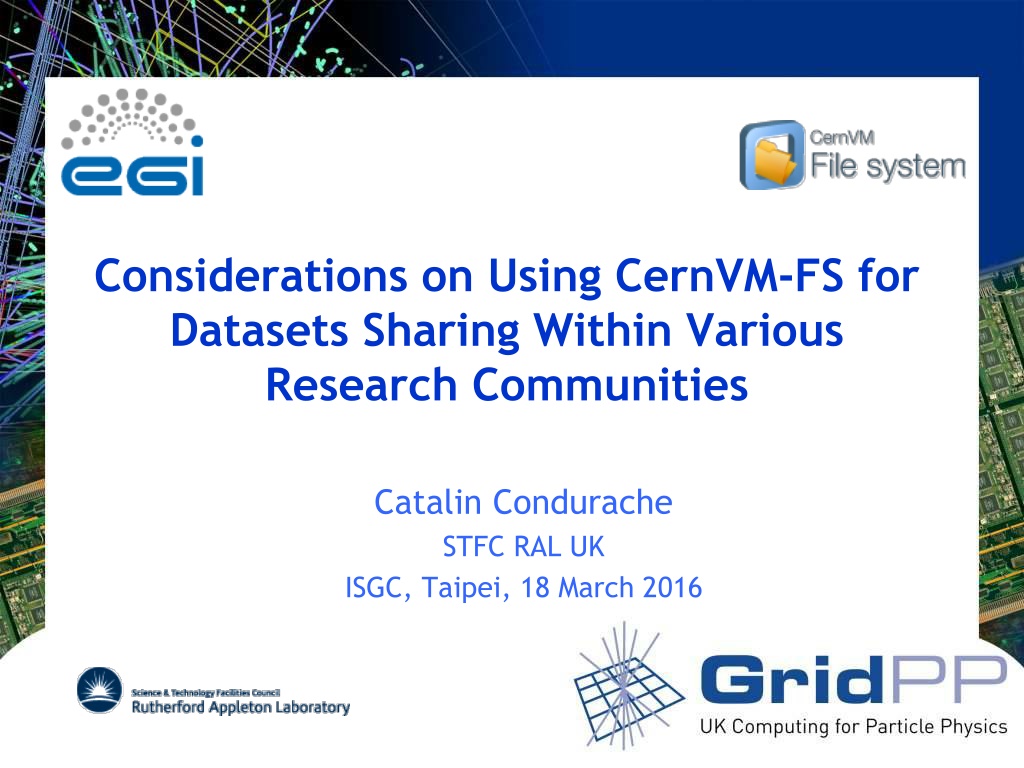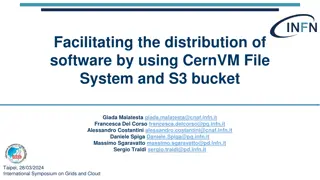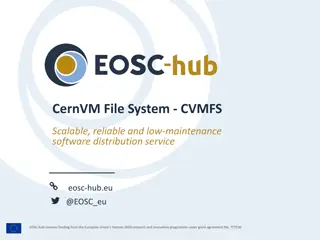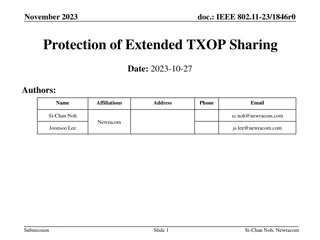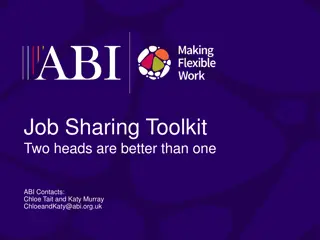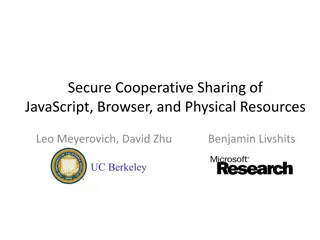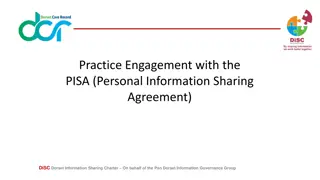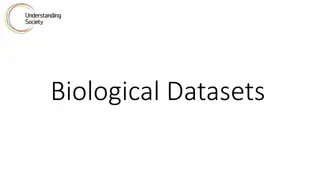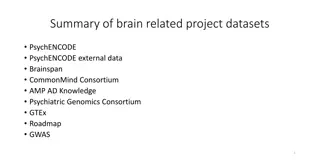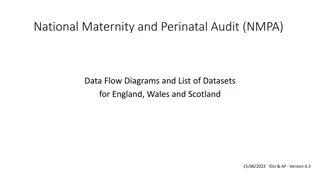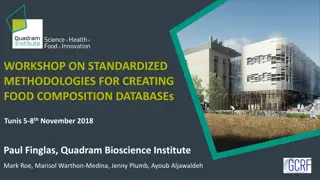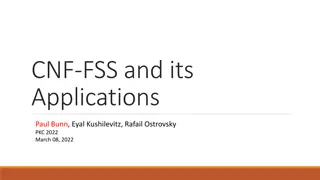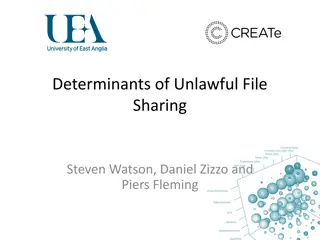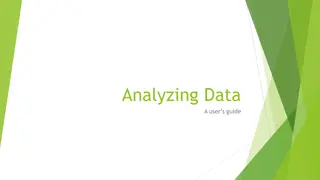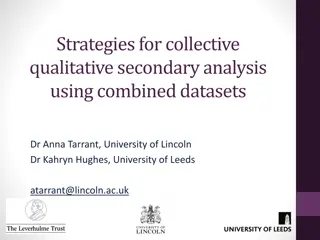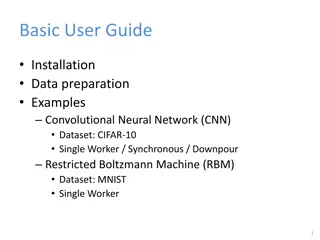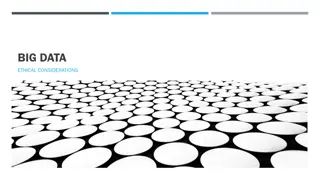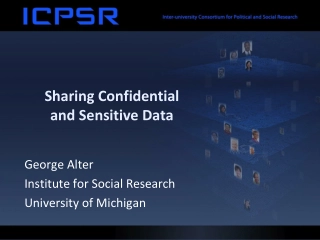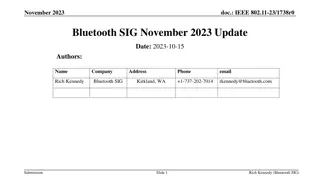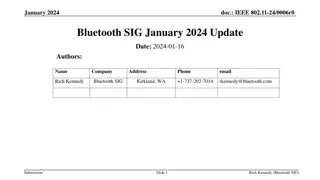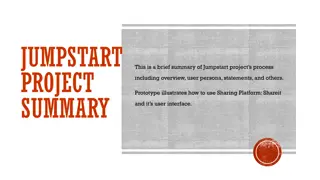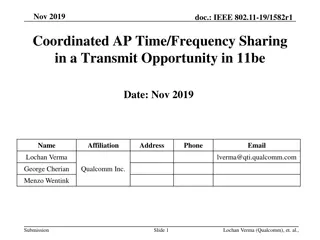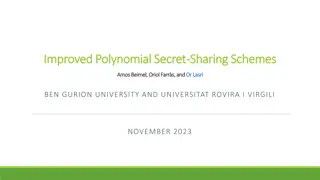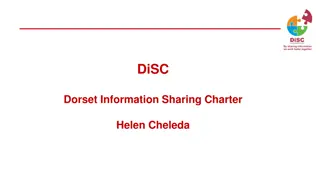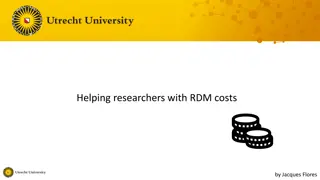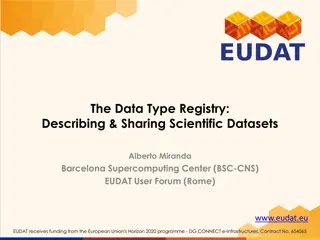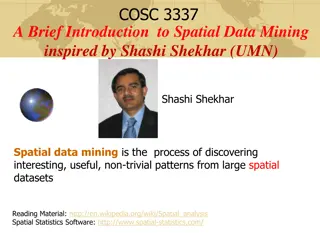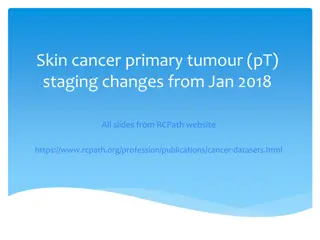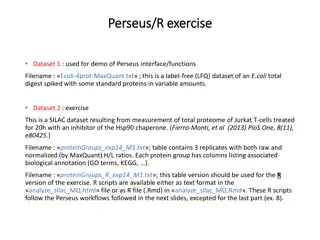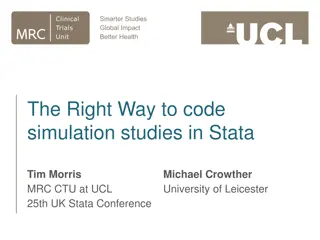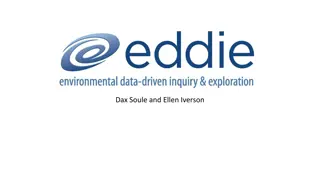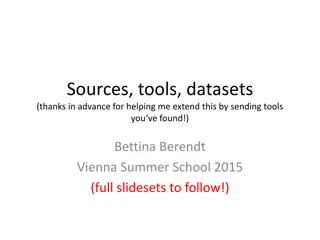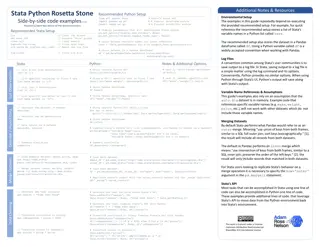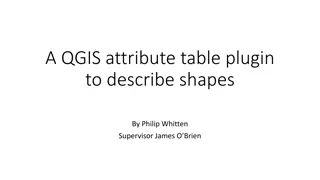Considerations on Using CernVM-FS for Datasets Sharing
CernVM-FS is a read-only file system facilitating the distribution of experiment software to grid worker nodes efficiently. This technology allows for easy software deployment and sharing across various research communities, making it a reliable option for dataset management and collaboration.
Download Presentation

Please find below an Image/Link to download the presentation.
The content on the website is provided AS IS for your information and personal use only. It may not be sold, licensed, or shared on other websites without obtaining consent from the author. Download presentation by click this link. If you encounter any issues during the download, it is possible that the publisher has removed the file from their server.
E N D
Presentation Transcript
Considerations on Using CernVM-FS for Datasets Sharing Within Various Research Communities Catalin Condurache STFC RAL UK ISGC, Taipei, 18 March 2016
Outline Introduction Bit of history EGI CernVM-FS Infrastructure Status What is a dataset? Dataset sharing with CernVM-FS Use cases ISGC, Taipei, 18 March 2016
Introduction - CernVM-FS? CernVM File System is a read-only file system designed to deliver experiment software to grid worker nodes over HTTP in a fast, scalable and reliable way Built using standard technologies (fuse, sqlite, http, squid and caches) ISGC, Taipei, 18 March 2016
Introduction - CernVM-FS? Files and directories are hosted on standard web servers and get distributed through a hierarchy of caches to individual grid worker nodes Mounted in the universal /cvmfs namespace at client level ISGC, Taipei, 18 March 2016
Introduction - CernVM-FS? Software needs one single installation, then it is available at any site with CernVM-FS client installed and configured Relocatable, dependencies included Standard method to distribute HEP experiment software in the WLCG, also adopted by other grid computing communities outside HEP ISGC, Taipei, 18 March 2016
Introduction - CernVM-FS? Due to increasing interest, technology has been optimized also for access to conditions data and other auxiliary data file chunking for large files garbage collection on revision level file system history ISGC, Taipei, 18 March 2016
Introduction - CernVM-FS? Also because of use of standard technologies (http, squid) => CernVM-FS can be used everywhere i.e. cloud environment, local clusters (not only grid) I.e. add CernVM-FS client to a VM image => /cvmfs space automatically available ISGC, Taipei, 18 March 2016
Bit of History CernVM-FS Last 5+ years distribution of experiment software and conditions data to WLCG sites has been changed massively CernVM-FS became the primary method No need of local installation jobs (heavy loaded) network file servers It relies on a robust decentralised network of repositories replicas and caches ISGC, Taipei, 18 March 2016
Bit of History CernVM-FS In parallel the use of CernVM-FS in communities outside WLCG and HEP has been increasing steadily Growing number of repositories and CernVM-FS servers around the world ISGC, Taipei, 18 March 2016
Bit of History CernVM-FS ~3 years ago RAL Tier-1 started a non-LHC Stratum-0 service Inception of EGI CernVM-FS infrastructure The European Grid Infrastructure (EGI) enables access to computing resources for European scientists and researchers from all fields of science, from High Energy Physics to Humanities ISGC, Taipei, 18 March 2016
EGI CernVM-FS Infrastructure Status Proxy Hierarchy Stratum-0 NIKHEF nikhef.nl Current topology Stratum-1 NIKHEF Proxy Hierarchy Stratum-0 RAL egi.eu Stratum-1 CERN Proxy Hierarchy Stratum-1RAL Stratum-0 DESY desy.de Stratum-1 DESY Stratum-1ASGC Proxy Hierarchy Stratum-1TRIUMF ISGC, Taipei, 18 March 2016
EGI CernVM-FS Infrastructure Status Topology follows WLCG model Stratum-0 are disjoint and represent the source repositories where software is installed by VOs Stratum-0, Stratum-1 can be geographically co- located or not It partially makes use of the existent hierarchy of proxy servers used for LHC software distribution ISGC, Taipei, 18 March 2016
EGI CernVM-FS Infrastructure Status 37 software repos currently hosted and replicated HEP and non-HEP Stratum-0s at RAL, NIKHEF, DESY Stratum-1s at RAL, NIKHEF, TRIUMF, ASGC 5 repos at the time of EGI CernVM-FS Task Force kick-off (Aug 2013) BIG change in two-and-half years! ISGC, Taipei, 18 March 2016
EGI CernVM-FS Infrastructure Status Stratum-0 at RAL 29 repos 2.15 Mio files 6.65 Mio on uploader 829 GB ~107KB average filesize (between 36KB and 3MB) ISGC, Taipei, 18 March 2016
EGI CernVM-FS Infrastructure Status At RAL 29 repositories on Stratum-0 Some more dynamic / less dynamic pheno.egi.eu 377 releases phys-ibergrid.egi.eu 5 releases t2k.egi.eu 139 releases glast.egi.eu 4 releases Some big / not so big chipster.egi.eu - 313GB phys-ibergrid.egi.eu - 69MB biomed.egi.eu - 177GB ligo.egi.eu - 2.8GB t2k.egi.eu 59GB wenmr.egi.eu 3.8GB ISGC, Taipei, 18 March 2016
EGI CernVM-FS Infrastructure Status Stratum-1 at RAL It replicates 58 repos from RAL, NIKHEF, DESY, OSG, CERN Over 10 TB ISGC, Taipei, 18 March 2016
EGI CernVM-FS Infrastructure Status Last 12 months activity egi.eu Hits by repository on Stratum-1@RAL x1000 ISGC, Taipei, 18 March 2016
What is a Dataset? Collection of data A file is the smallest operational unit of data Files are aggregated into datasets (a named set of files) Datasets can be grouped into containers (a named set of datasets) ISGC, Taipei, 18 March 2016
What Is a Dataset? If possible, files are kept large (several GB) Datasets often contain thousands of files with events recorded under constant conditions All this from a LHC / HEP perspective Is this true from an EGI non-HEP research community perspective? ISGC, Taipei, 18 March 2016
Datasets Sharing with CernVM-FS? Nowadays CernVM-FS used for software (and conditions data) distribution Grid jobs tend to be started in large batches running the same code High cache hit ratio at proxy cache level In what situations Can datasets be shared via CernVM-FS? Well ISGC, Taipei, 18 March 2016
Datasets Sharing with CernVM-FS? Datasets are usually large amount of data (big- sized files) that are not quite appropriate for distribution via CernVM-FS While the system can cope with big files nowadays (file chunking), pure data set distribution would render any kind of cache useless (especially at client level) The low cache hit ratio would impact the proxy caches engineered with relatively low bandwidth ISGC, Taipei, 18 March 2016
Datasets Sharing with CernVM-FS? but could be considered within some limits though There is at least some sharing involved very frequent data re-accessing datasets that are required by many nodes simultaneously (i.e. conditions data) Burst of co-located clients that are using the same data When datasets are small and proper dedicated storage not first option (or not available) ISGC, Taipei, 18 March 2016
Use cases CERN@school Educational purpose Small test data sets < O(10MB) included within the repositories New users can get started straight away with the code Also for software unit tests ISGC, Taipei, 18 March 2016
Use cases As for "production" data sets - currently relying on a multi-VO DIRAC setup to manage the data via the DIRAC File Catalog (DFC) - it has the needed metadata capabilities ISGC, Taipei, 18 March 2016
Use cases Using CernVM-FS to distribute several genomes and their application indexes and some microarray reference datasets to Chipster servers Chipster could also use CernVM-FS for distributing other research datasets too BLAST databases indexes needed to do sequence similarity searches for protein or nucleotide sequences (~100GB) ISGC, Taipei, 18 March 2016
Use cases Adding BLAST DBs to the current Chipster, would increase the size of the virtual image by 100 GB - too much New releases of the databases are published about once a month. If incorporated to the Chipster image, the users would need update their (too big) virtual images regularly ISGC, Taipei, 18 March 2016
Use cases By using CernVM-FS the latest versions of BLAST datasets could be provided to the Chipster users in a centralized and more effective storage way Very interested to continue using CernVM-FS for sharing both scientific tools and datasets for the Chipster servers running in EGI Federated Cloud ISGC, Taipei, 18 March 2016
Use cases Some dataset distribution ~180 MB of data that have to be always fed as an input to the simulation - it sets up the environment It is possible to have to upload another set of input data in order to have a different setup ISGC, Taipei, 18 March 2016
Use cases LIGO (UK) Recent dataset was 1.5TB in 5400 files 12 directories, each file up-to 450MB Not suitable, but ISGC, Taipei, 18 March 2016
Use cases from time to time people create fake data with fake signals Fewer files, so might be a good fit for CernVM-FS Waiting for the opportunity to arrive ISGC, Taipei, 18 March 2016
Use cases AUGER Do not plan to use CernVM-FS for a data distribution in the near future May consider it for distribution of some relatively small databases, but not yet even a plan for tests ISGC, Taipei, 18 March 2016
CernVM-FS vs Datasets Sharing - Conclusions CernVM-FS should not be first option It may affect the performance of the service at Stratum-1 and squid level if some conditions do not meet At least some sharing involved, like very frequent data re-accessing Or data sets that are required by many nodes simultaneously (i.e. conditions data) ISGC, Taipei, 18 March 2016
CernVM-FS vs Datasets Sharing - Conclusions Use instead a Storage Element (SE) Not always possible or setup a Web server /cvmfs/<path_to_file> -> wget http://host/<path_to_file> Still could make use of squids and caches or use NFS for local storage ISGC, Taipei, 18 March 2016
CernVM Users Workshop, RAL, 6-8 June 2016 - https://indico.cern.ch/event/469775 - registration open! ISGC, Taipei, 18 March 2016
Other Conclusions? ISGC, Taipei, 18 March 2016
Thank you! ISGC, Taipei, 18 March 2016
